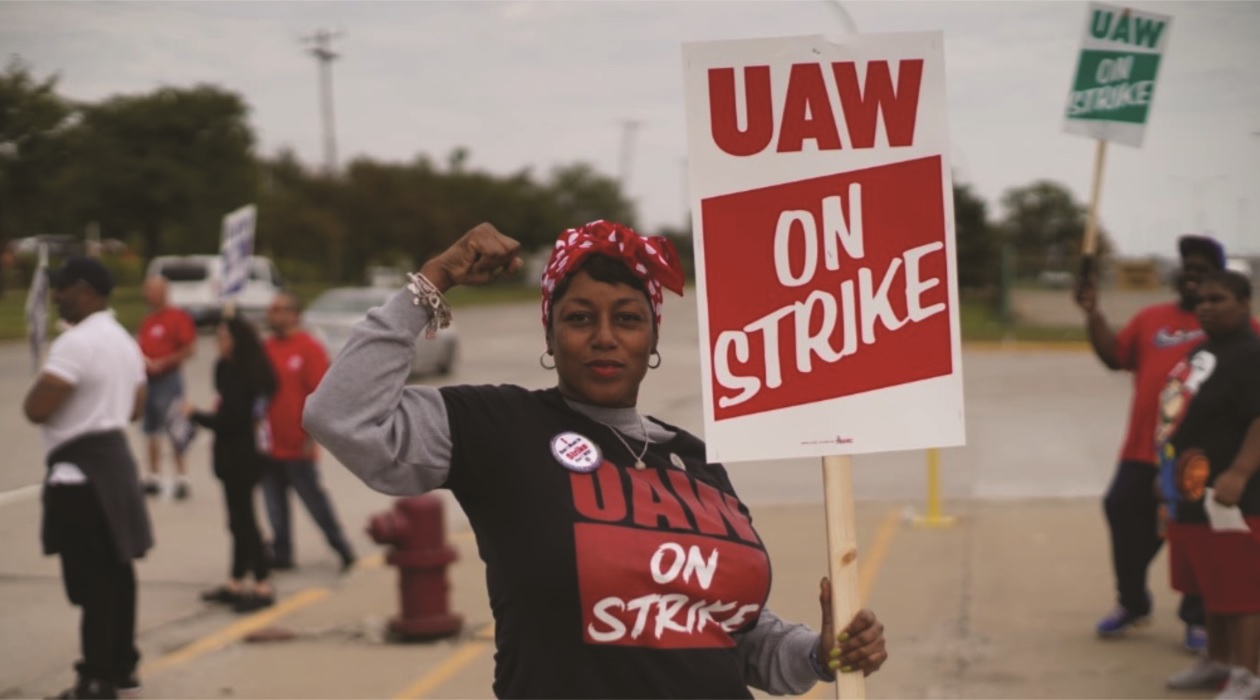
DETROIT—In his strongest and longest emphasis on the working class versus the corporate class, Auto Workers President Shawn Fain repeatedly stressed that theme while unveiling “a new phase” in the union’s “Stand Up!” strike strategy against Detroit’s Big 3 automakers.
Speaking to union members via Facebook Live (available on YouTube, forward to the 28-minute mark) on Oct. 13, Fain said future decisions by union bargainers to increase pressure on the car companies would be at random by day and by company and told all locals to be ready at any time to be next.
That was the meaning, he said, of UAW bargainers’ decision the day before, on Thursday, to have the 8,700 members of Local 862 at Ford’s Louisville truck plant walk. The plant is Ford’s biggest moneymaker, at $25 billion per year “or $48,000 per-worker-per-minute,” Fain said. Prior walkouts had been announced every Friday since the strike began at midnight on Sept. 14-15.
That Thursday call to Local 862 was meant to send a message to the other two car firms, GM and Stellantis, formerly Jeep/Chrysler, too.
From now on, “We’ll be calling out plants where we need to and when we need to—and not just on Fridays and not just at Ford,” he said.
But Fain spent most of his presentation on the contrast between the working class and the corporate class, and not just at the car companies. “Our fight’s not just about us. It’s about the working class. Our companies exploit us across borders. We’ve got to fight back across borders,” Fain began—and he was just getting started.
Fain explained he and the other members of UAW’s new leadership—elected earlier this year in the union’s first-ever one-member-one-vote popular balloting—are responding to members who are fed up with steadily losing ground while firms rake in billions in profits and corporate bosses and Wall Street investors garner millions in pay, stock options, and buybacks from the workers’ labor.
“Our broken economy raised expectations” among the UAW’s 150,000 members who toil for Detroit’s automakers, he said. With the Louisville walkout, approximately one of every six are now on strike.
“Corporate America rebounded after the recession” more than a decade ago “and profits were soaring,” he elaborated. “In fact, corporations hit a 70-year high in profits in 2022.
“Meanwhile, the working class kept going backwards,” with raises, when they occurred, running behind inflation. And prior giveback contracts the firms pushed onto UAW left some workers without a raise at all for more than 15 years. “We’ve seen our standard of living decline and income inequality increase to heights unseen since the Great Depression” of the 1930s.
At the Detroit car companies alone, UAW previously revealed, profits totaled $251 billion in the last decade and were running at even higher levels this year.
At the UAW, Fain said, the cause of the rising inequality “is rising company bank accounts and company executives making hundreds of times what the average worker makes. Standing up for yourself is not dangerous, and it’s an obligation to yourself and future generations.”
Analyses of executive pay data, taken from federal filings and compared to workers’ pay, bear Fain’s statements out. Ford CEO James Farley’s total compensation in 2022 was $20.997 million, 281 times the median compensation of a Ford worker. GM’s Mary Barra took home $28.98 million, 362 times the median compensation for her firm’s workers. The median is the point where half the workforce is above and half below. Stellantis is headquartered in Holland, so it’s not listed in the federal filings.
“What’s truly dangerous” to workers and to society in general “is when inequality spins out of control,” Fain said. “What’s dangerous is when the ultra-rich get richer while the working class falls further behind.”
What he did not get into—but sociologists and other analysts do—is the heightened frustration and antagonism such yawning pay chasms bring to society as a whole.
Reactions to those not only appear in the strike wave that has hit the U.S. in the last two years but also in resentment, expressed, Fain said, by a recent Associated Press poll of registered voters which showed only 9% sided with the car company bosses.
It’s also expressed by voters seeking the proverbial, and dictatorial, “man on the white horse,” sociologists point out.
“What’s truly dangerous is to let companies and politicians kick workers while we’re down, gut our unions, rig our economy” and expect workers to accept crumbs, he said.
“So unless employers start coming to their senses” and yield to workers, especially union workers “gains equal to the gains we’ve seen on Wall Street, we’ll see a lot more strikes” in both the short and long runs, Fain predicted.
Indeed, he noted, another one could start this coming weekend. “In Ohio, Michigan, and Pennsylvania, 1,100 workers at General Dynamics”—a major military contractor, though Fain did not say so—“just took a strike authorization vote and it passed with 97%” approval. “Their contract expires Saturday.”
>> READ MORE PEOPLE’S WORLD COVERAGE OF THE UAW STRIKE.
We hope you appreciated this article. At People’s World, we believe news and information should be free and accessible to all, but we need your help. Our journalism is free of corporate influence and paywalls because we are totally reader-supported. Only you, our readers and supporters, make this possible. If you enjoy reading People’s World and the stories we bring you, please support our work by donating or becoming a monthly sustainer today. Thank you!










